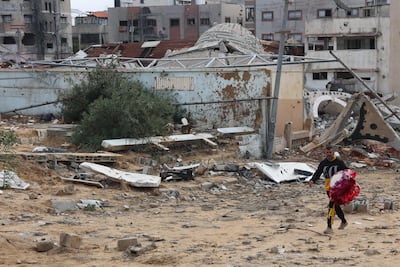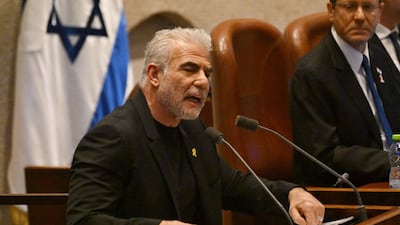Live updates: Follow the latest on Israel-Gaza
Yair Lapid, the leader of Israel’s opposition, outlined a road map towards ending the war in Gaza and restoring peace in the Middle East after more than a year of conflict that still threatens to spread across the region.
In an article in The National, Mr Lapid, who is also a former prime minister, said that the goal of Israel establishing relations with Saudi Arabia is a “single organising principle that deals with all the arenas in which Israel is involved”. It could lead to a separate Palestinian state being established, he added.
Mr Lapid’s views about how to reach a plan that “appears to be acceptable to all the relevant players” come as Israel’s far-right government, led by Prime Minister Benjamin Netanyahu, faces accusations at home and abroad that it is deliberately avoiding a long-term strategy for the Gaza War, in a bid to keep the coalition together. More than 44,200 people have been killed in Gaza and more than 3,750 in Lebanon since October 7 last year.
Perceptions have rarely been higher among Israelis and Palestinians that a peaceful, diplomatic solution to the conflict can be found, as fears increase that Israel will use a new sympathetic American administration to seize significant amounts of Palestinian land.

Mr Lapid said the recent victory of president-elect Donald Trump was an “opportunity for Israel”. He said the new US administration “is not afraid of bold initiatives", adding that Israel can work with it “from day one on changing the face of the Middle East”. Opposition parties in Israel are continuing to lose ground in opinion polls to Mr Netanyahu, whose slow but steady increase in popularity bucks previously widespread predictions in Israel at the beginning of the war that he could not remain in office.
The trend has been spurred by several recent tactical Israeli successes, particularly during its invasion of Lebanon, which contrasts the widespread security failures during the October 7 attacks. About 1,200 people were killed in the Hamas-led attacks on southern Israel, which also saw more than 251 people taken hostage.
Mr Lapid wrote that a “strategic victory for Israel” would be based on diplomatic initiatives that include the return of Israeli hostages, replacing Hamas in Gaza with a civilian government, removing Hezbollah from Israel’s northern border and building a regional coalition against Iran. He added that the path towards this diplomatic process would start with the release of Israeli hostages during a transitional period in Gaza, alongside a “permanent arrangement” in Lebanon. An international force would enter Gaza in the transitional period that “could include the UAE, Egypt, Morocco and a civilian arm of the Palestinian Authority”.
A regional conference would then be convened in Saudi Arabia to consolidate these elements, as well as work to “halt the progress of the Iranian nuclear programme by diplomatic or military means, and to stop Iran's attempts to achieve hegemony in the Middle East through proxy forces”.
The conference would then work towards the establishment of relations with Saudi Arabia and publish a statement “according to which all parties will work to create the conditions for a future separation between Israelis and the Palestinians, according to the two-state principle”.

Mr Lapid doubled down on accusations that the Netanyahu government is not capitalising on widespread desire for a diplomatic regional solution because it “is not ready to accept that the [Palestinian Authority] will be part of any agreement”. It has an hawkish attitude towards the Palestinian Authority, many of whose members it accuses of supporting terror and delegitimising the state of Israel in international diplomatic forums such as the UN.
“Opposition to the PA's involvement in the Saudi normalisation process stems mainly from domestic political considerations,” Mr Lapid said. “This is an enormous mistake. Israel is denying itself a strategic victory that would benefit its security and its economy and improve its international standing. There is no victory without a diplomatic element. Israel can and should initiate a new regional order.”


